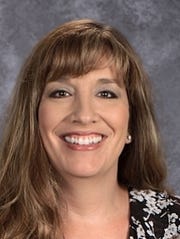by Dennis Dalman
Incumbent St. Cloud school board member Monica Segura-Schwartz said she believes the school district must continue to make strong, concerted efforts to connect more with the community for the sake of residents, including students.
“Our school administration is moving forward developing trust and relationships with our community, and I keep doing my best to support that effort,” she said. “At the end of the day, those are the relationships that matter in terms of students’ health – emotional, physical and scholastic.”
Segura-Schwarz, 47, is vying for re-election, competing with seven other candidates, including two other incumbents. There are four seats open on the school board for the Nov. 3 general election. Incumbent Jeff Pollreis did not file for re-election.
Born in Bogota, Colombia, Segura-Schwartz earned a degree in electrical engineering from Pontifical Xaverian University. She then worked as an engineer for 10 years before moving to the United States to earn a master’s degree in social responsibility from St. Cloud State University. It was there she met a St. Cloud man whom she married 12 years ago. More recently, she earned another master’s degree in advocacy and political leadership from Metro State University. She has been a facilitator for the Community Anti-Racism Workshop at SCSU and was appointed by Gov. Mark Dayton and then re-appointed by Gov. Tim Walz to serve on the board of the Minnesota Latino Affairs Council.
Segura-Schwartz gave her responses to the following questions for the St. Joseph Newsleader:
How can you help ensure every child has full access to the best education so no child is left behind?
Segura-Schwartz said she is a strong advocate of setting goals and systems of evaluation at every level, including long- and short-term impacts. Evaluations are key, she added, to adjusting and making changes and finding out where more support is needed and adjusting expenditures to that end. The building of trust between the school administration and the community is essential to ensure all children receive the finest education.
“I am not afraid of tense or difficult conversations and do my best to honestly hear everyone,” she said. “I encourage our board to reach out to our constituents and work more creatively in getting more community input at our board meetings and other functions.”
How can you help guarantee a zero-tolerance policy against teasing, taunting and bullying is not only emphasized but consistently enforced?
Segura-Schwartz said there are multiple support systems within the schools to address unacceptable behaviors. A 10-page policy concerning bullying was recently reviewed by the board and is frequently under review.
The issue, she said, is complex and needs widespread discussion.
“I see bullying happening all around us – in the media and with a great number of adult interactions right now,” she said. “We ‘adults’ must understand that children mimic us. They tend to learn what we do more than what we tell them to do. I am not perfect. I have my faults, but with practice I have learned to notice them and learn from them, at least some of the time. I ask our administration, teachers and community to do the same.”
Some say there is too much emphasis on written tests to measure students’ progress. How do you feel about testing?
Testing is only one way of evaluating, and evaluations are vital if progress is to be made, Segura-Schwartz said. In recent years, the “Star” system of multidimensional evaluation has been put into place to measure academic progress, but that too is partly based on testing, she noted.
She said schools examine data every week to assess students’ progress in terms of discipline, academic achievement, attendance, assignments and so forth.
“I believe we need to figure out how to report that better to our community,” she said. “Unfortunately, the state looks at us for comparison with other districts only in a few dimensions, test scores being one of them.”
Please address two or three school issues you care most about and what you would like to do to make changes (if any) regarding those issues?
Segura-Schwartz, who is passionate about the arts, said she strongly believes they are lost in the shuffle in schools to the point that in some schools throughout the state they are disappearing from curricula.
“Art education is more than singing or playing an instrument,” she said. “It is learning how to be out of our comfort zone, being exposed to positive criticism of ourselves, encouragement to get creative and build something no one else did.”
Fewer and fewer children are being exposed to a variety of art education in schools, she said, to the point that when those children become adults, they do not value the enriching importance of arts.
“I have been consistent in showing this interest in art education and bringing it up to the administration, and I will continue to do so,” she said.
Other comments?
The Covid-19 crisis is a huge challenge for schools, Segura-Schwartz noted.
“We really need to work together to figure this out,” she said. “I am deeply concerned for all of our community and the wide range of opinions that everyone has about the way that school should work next year. This is not a perfect system. However, the system before Covid was not perfect either. I am hoping this time will help us develop stronger ways of personalized education that address each student’s needs specifically.”
She said that can happen only if everyone is working closely together – the schools, the school board, the administration and the community.

Monica Segura-Schwartz



